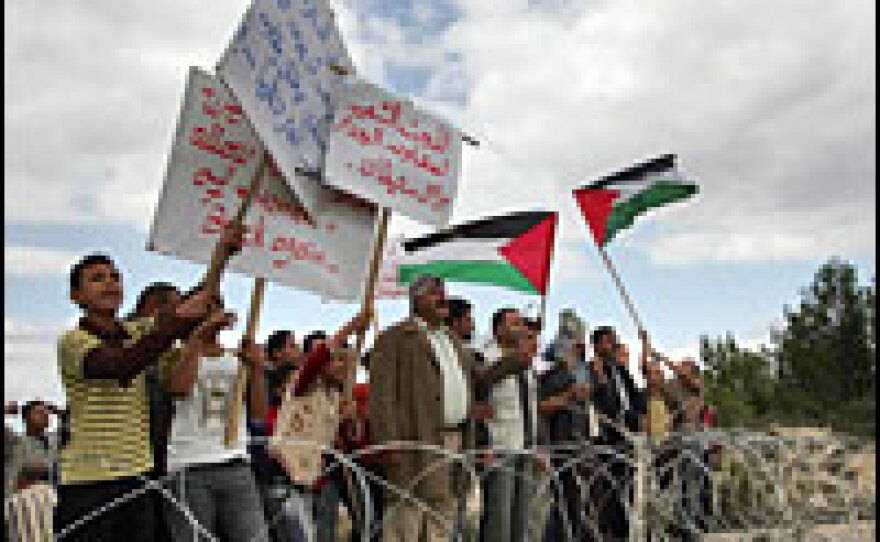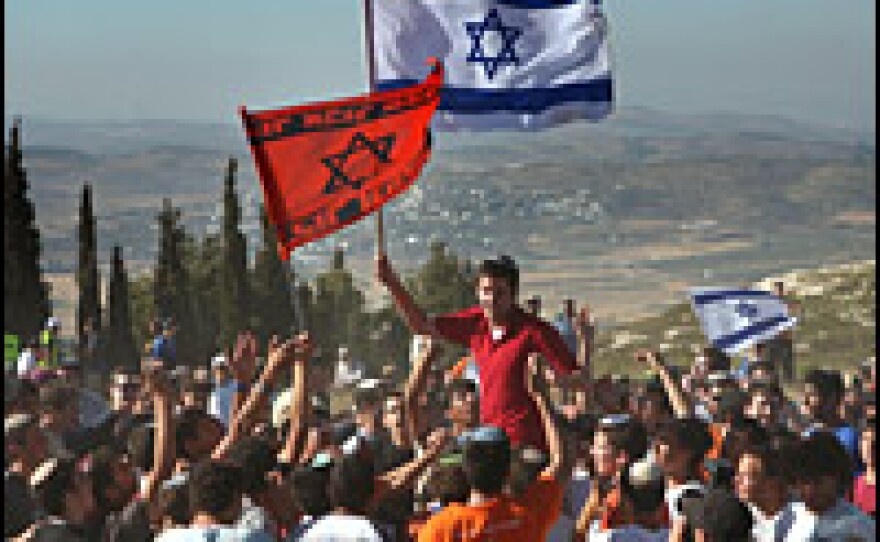
One of the most contentious issues between Israel's government and the Obama administration is Jewish settlements in the West Bank.
Washington wants all settlement activity stopped in an effort to restart Israeli-Palestinian peace talks, while the government of Israeli Prime Minister Benjamin Netanyahu supports settlement expansion.
It will top the agenda Tuesday when Israeli Defense Minister Ehud Barak meets with George Mitchell, the Obama administration's Middle East envoy, in an effort to defuse tensions.
But Israel's devout settlers say expansion will continue, even in a West Bank settlement that Israel has already given up.
Homesh is one of four Jewish settlements in the West Bank that Israel evacuated at the same time it withdrew settlers from the Gaza Strip in 2005. Israeli authorities moved the residents out of Homesh — where about 100 families lived — and razed their homes.
But some settlers have returned and say they are determined to bring Homesh back to life.
Mission To Reclaim Territory
Yair — who doesn't want to give his last name because it is illegal for him to be in Homesh — says that the settlers now have a continuous presence here.
"For us, it's important to be in Homesh and not to forget this place. We are here as part of a mission, because every piece of land in the land of Israel has to remain in our hands," he says.
Religious fervor fuels settlers like Yair. They believe that God gave the Jews the right to populate all of the area between the Mediterranean Sea and the Jordan River. That includes an area slightly smaller than Delaware along the river's west bank, which the settlers call by the biblical names Judea and Samaria.
Yair says that their presence in Homesh keeps Palestinians from reclaiming this land. Israel captured the West Bank, at the time part of Jordan, in the 1967 war. Palestinians hope to make the West Bank part of an independent state.
"The Palestinians do pass by from time to time, and they think it's uninhabited. We talk to them and tell them that we are back. We say this land is Jewish. We behave like we are in any Jewish settlement so they know they are not allowed to come here," he says.
Settlers: Israel Lacks Willpower, Manpower
Limor Sohn Har-Melekh, a former resident of Homesh, now lives in a nearby Jewish settlement.
Palestinian gunmen killed her first husband in an attack outside Homesh as the family was returning to its home there before the evacuation. She was seriously wounded.
She is now an active member of a group called Homesh First. Their aim is to make it impossible for the Israeli authorities to prevent settlers from returning to Homesh.
"My organization is leading the way back. As far as we are concerned, every square foot of land is important. I miss Homesh. If we agree to surrender small parts of the land, then they could take all of the land back," she says.
Settler leaders say the Israeli government doesn't have the manpower or the willpower to keep them out of Homesh — or anywhere else — and their presence at the evacuated settlement proves it.
Har-Melekh vows she will one day return to Homesh to live. In the meantime, she accompanies groups of settlers — sometimes thousands of them — to the site to mark Jewish holidays and other occasions.
"They can't prevent us from going up and having a continual presence there. I had the circumcision of my son on the ruins of my old house in Homesh. There were hundreds of people. It was a sign from God that if you want something enough, you can achieve it," she says.
Palestinians Question Israel's Commitment
Just below the ruins of Homesh is the Palestinian village of Burqa. Children play on its dusty streets next to old stone buildings.
The village's deputy mayor, Iyad Abu Omar, says that the evacuation of Homesh in 2005 was a media show that did little to benefit the Palestinians.
"Practically speaking, the settlers have not left Homesh. We are unable to go to our land there, and therefore to us, Homesh has not been evacuated," he says.
He says the Israeli military has declared Homesh a closed military area, which makes it illegal for Palestinians to visit Homesh, much less use the arable land that surrounds it.
"What the Palestinians here want to know is: Why haven't the Israelis given us back the land of Homesh? What are they waiting for?" he says.
Mohammed Al-Saleh also lives in Burqa and is part of an anti-settlement group.
"I do not believe the Israelis will ever leave this place. Most settlements like Homesh are established in strategic areas," he says.
"We just don't expect them to give up that land," he says, looking up toward Homesh.
Copyright 2022 NPR. To see more, visit https://www.npr.org. 9(MDAzMjM2NDYzMDEyMzc1Njk5NjAxNzY3OQ001))







